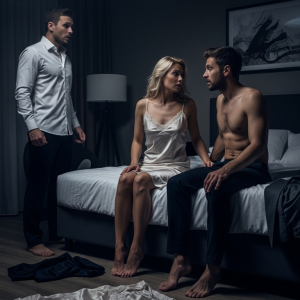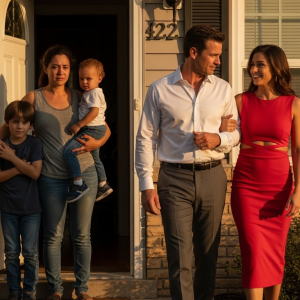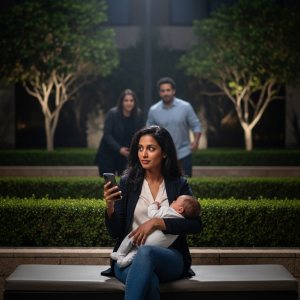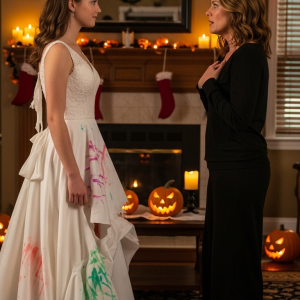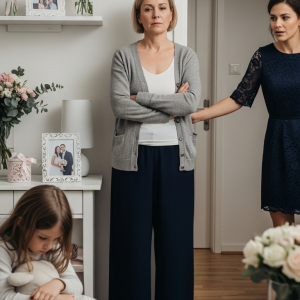It all started with a crusty iPhone 6. I was seventeen, and the charging port was so worn out you had to angle the cable just right, praying to the tech gods for a connection. My thirteen-year-old sister, Amelia, had the latest model. One afternoon, while she was in the bathroom, she left her iPhone 10 on her bedside table. Her password was our dog’s birthday—a detail so simple, so innocent, it felt like a relic from a different time. I got in straight away.
My motives weren’t malicious. I was texting my crush and wanted to send a selfie, but my phone’s camera was garbage. I figured I’d use Amelia’s and send the picture to myself. As I opened her camera, I scrolled through the camera roll, looking for a photo to delete if I needed space.
That’s when I saw it.
It wasn’t one picture, but dozens. Then hundreds. It was an endless gallery of my sister, in poses no thirteen-year-old should know, wearing nothing at all. A wave of nausea washed over me, cold and acidic. My stomach churned. Before I could process the shock, a notification lit up the screen. It was from an app called Whisper.
For those who don’t know, Whisper is a platform for anonymous confessions. But it has a dark reputation, a known hunting ground for online predators. My protective instincts took over, a primal urge to shield my little sister from a danger I couldn’t yet comprehend. I clicked the notification.
My heart didn’t just twist; it felt like it was being crushed in a vice. My pre-teen sister was engaged in conversations with dozens of men, all of whom claimed to be over forty. She was sending them the very images I had just seen, catering to their requests with an obedience that terrified me.
The sound of the toilet flushing jolted me back to reality. Amelia was coming out. I quickly placed her phone back on the nightstand, my mind racing as I tried to compose my face into a mask of normalcy. I pretended to be engrossed in my own faulty phone as she walked back into the room.
That evening, I did something I will regret for the rest of my life. I told our parents.
I waited until Amelia was asleep, her quiet breathing a stark contrast to the storm brewing inside me. My parents were in the living room, bathed in the blue glow of a Netflix show.
“Mom? Dad?” I started, my voice wavering.
I expected disbelief, maybe even accusations of snooping. I had no evidence to show them. But to my complete surprise, their reaction was volcanic. My dad’s face went rigid, the jovial mask he wore for television dropping in an instant. He turned to my mom, his voice a low, shocked whisper. My mom, a master of composure, had tears welling in her eyes.
“Son,” she said, her voice trembling with what I mistook for genuine sorrow. “Thank you for telling us. You did the right thing. We’ll take it from here.”
I nodded, a profound sense of relief washing over me. I had done my duty as an older brother. The next day, Amelia’s phone was confiscated for a month. When she finally got it back, our parents announced they would be checking it daily. I believed the crisis was averted. I thought I had saved her.
I guess when it rains, it pours. While Amelia was grounded from her phone, our family’s fortunes took a dramatic, almost unbelievable turn. The sputtering Toyota Corolla, which seemed to break down weekly, was suddenly replaced by a silent, gleaming Tesla. My mother’s modest wedding ring was swapped for a diamond that blinded you in the sunlight. Amelia’s wardrobe, once a collection of Goodwill finds, was overflowing with clothes from Brandy Melville and Urban Outfitters.
I didn’t question it too much. My dad, a lawyer, had been talking non-stop for months about landing a huge case, about how his ship was finally coming in. I just figured he’d done it. He had finally figured things out.
A few weeks later, I was walking past Amelia’s room and glanced inside. She was on her phone again, her thumbs a blur across the screen. I saw the familiar purple icon of the Whisper app. A cold sweat prickled across my skin. She was back on it, texting so furiously it looked like her hands were detached from her body.
I immediately texted my mom, my fingers shaking. “Amelia is doing it again. She’s back on that app.”
Her response came a minute later, and it stopped my world from turning. “You need to learn to respect your sister’s privacy. She’s 13 now. She can make her own decisions.”
I stared at the screen, reading the words over and over. Respect her privacy. The sentence seemed to mock me. Privacy? My thirteen-year-old sister was being preyed upon by older men, and my mother was suddenly an advocate for her “privacy”? The logic was so warped, so fundamentally wrong, that my brain couldn’t process it.
I didn’t know what to do. Amelia wouldn’t listen to me, and going to the authorities felt like it would get her in trouble. I tried a different approach. I tried to distract her, to pull her back into a world of childhood innocence. For three days, we played Minecraft together, building castles and exploring digital caves. For a moment, it felt normal. I hoped it would be enough to show her she didn’t need validation from strangers online.
On the third day, my parents brought it to a halt. They screamed at me, their voices echoing in the hallway. I was “distracting Amelia from what’s important,” they said. I was banned from playing with her.
The signs became impossible to ignore. Every day, my mom came home with shopping bags from high-end lingerie stores. They replaced Amelia’s phone with the newest model. Her bedroom, once a simple space for a young girl, began to transform. It started to look like a production set, with professional-grade ring lights and tripods. The minimalist, sweet girl I knew vanished. In her place was a stranger who spent two hours every morning perfecting her makeup, hyper-fixating on every contour and highlight as if her life depended on it.
Privacy was a luxury we could no longer afford. I went through her old phone, which was sitting discarded on her desk. And suddenly, the horrifying picture became crystal clear.
Amelia wasn’t just texting these men. She was running a business. Men, ranging in age from forty to seventy, were sending her hundreds, sometimes thousands, of dollars. In exchange, she provided photos, videos, and even live video calls.
That’s when I heard the door creak open. It was my sister.
Her eyes were wide with panic. “Please,” she whispered, her voice cracking. “Please don’t tell Mom and Dad you found out.”
And then she collapsed, her small frame crumpling to the floor as sobs racked her body. I rushed to her side, and through her tears, she choked out the words that would haunt me forever.
“Dad told me I didn’t have a choice,” she wept. “He said my… my work is the only thing keeping this family together.”
I grabbed her hand, pulling her up. “We have to go to the police, Amelia. Now.”
She hugged me, burying her face in my chest, her body trembling. “I’m scared.”
“I know,” I said, my own fear a tight knot in my gut. “It’s okay to be scared. But this is the right thing to do.”
At the police station, a female officer listened to our story with a serious, compassionate expression. It felt like, for the first time, someone was truly hearing us. She excused herself to speak with her supervisor, and for ten minutes, I allowed myself to feel a sliver of hope.
The door opened again, but it wasn’t the officer. It was our parents.
My father, it turned out, had connections. As a lawyer, he had ties to every precinct in the area. He had a standing order: if his children ever came in to report anything, he was to be notified immediately. To him, I hadn’t just exposed a secret; I had jeopardized his moneymaker. And the look in his eyes told me he was about to make me pay for it. We were in more danger than we had ever been before.
My dad’s hand clamped around my arm with the force of a steel trap. His fingers dug into my skin, and I felt the bones in my forearm grind under the pressure. He dragged me toward the exit while my mom took Amelia’s hand, offering the officers a practiced, reassuring smile as if we were just a normal family having a minor disagreement.
The officer who had been helping us was nowhere in sight. In the sterile light of the station, under the watchful eyes of the law, we were utterly alone.
He shoved me into the back of the Tesla. The cold leather was a shock against my skin. The ride home was consumed by a dead, suffocating silence, broken only by my dad’s heavy, ragged breathing and the squeal of the tires as he took corners far too fast.
When we got home, they separated us. My dad’s hand never left my shoulder, propelling me toward my room while my mom guided Amelia to the living room. For hours, I could hear the low murmur of their voices, rising and falling like a tide. I pressed my ear to the wall, catching fragments—words like “responsibility,” “family loyalty,” and how I was too naive to understand the “real world.” Every time Amelia tried to speak, her small, trembling voice was immediately drowned out by theirs.
I stayed up all night, waiting for them to sleep so I could check on her. The digital clock on my nightstand mocked me: 11:00 p.m., midnight, 1:00 a.m. Around 3:00 a.m., I risked it. I crept out of my room, my bare feet silent on the hardwood floor. But he was waiting. My dad was sitting in the hallway on an old kitchen chair, still in his work clothes, his tie loosened. He didn’t yell. He didn’t say a word. He just stared at me with cold, unrecognizable eyes until I retreated to my room. The look on his face was more terrifying than any threat. It was like looking at a stranger wearing my father’s face.
The next morning, when I tried to leave my room, the door wouldn’t budge. I twisted the knob, my palms sweating, but it was locked solid. Then I saw it: fresh sawdust on the carpet and the glint of new metal. They had installed a deadbolt on the outside of my door. My parents had made me a prisoner in my own home.
For the next three days, my world shrank to the four walls of my bedroom. I banged on the door and yelled until my throat was raw, but no one came. My phone, laptop, and tablet were gone from my nightstand. They slid meals under the door—plain turkey and cheese sandwiches and bottles of water. The blandness felt intentional, a reminder of my powerlessness.
Through the walls, I could hear muffled conversations and, sometimes, Amelia crying. Her sobs cut through me like knives. I tried everything to escape. I unscrewed the doorknob with a coin, but the deadbolt held fast. I tried the window, but they had screwed it shut, the new screws shining in the daylight.
On the third night, I heard Amelia’s voice, louder this time. She was arguing with them. I pressed my ear to the plaster, straining to hear.
“I can’t do this anymore!” she cried out. “Please, I’m begging you… it’s wrong!”
Then, a sharp, unmistakable sound—a slap. And then, silence.
I pounded on the wall with both fists, screaming her name, but there was no response. Worry gnawed at me, a physical sickness in the pit of my stomach.
On the fourth morning, the deadbolt slid back. My mom stood in the doorway. She looked exhausted, with dark circles under her eyes, and she wouldn’t meet my gaze.
“Pack your things,” she said, her voice flat and emotionless. “You’re attending a boarding school. You start next week.”
She handed me a brochure for a place called “Wilderness Reformation Academy” in Montana. The photos looked like a prison camp, with high fences and stern-faced staff. This wasn’t about my education; it was about getting rid of me. I asked about Amelia, but she dismissed me. “She’s fine. You need to worry about yourself.”
That night, as I packed a suitcase, my hand brushed against something crinkled under my mattress. It was a folded piece of paper, a page torn from Amelia’s math notebook. Her shaky handwriting filled the page.
“I’m scared. Please don’t leave me alone with them. They’re making me do worse things now. Help me.”
Tear stains had smeared the ink. She must have slipped it under my mattress before they locked me in. Time was running out. They were shipping me off in a few days, and then she would be completely at their mercy. I had to do something.
At 2:00 a.m., I put my plan into action. Using a butter knife I’d saved from one of my meals, I worked on the screws holding my window shut. The metal bent and cut into my palms, but desperation was a powerful fuel. Finally, the screws gave way. I dropped to the grass below, jarring my ankles, and crept into the shadows.
Our next-door neighbor, Mrs. Harrison, had always been kind to us. She used to babysit us, a warm, grandmotherly figure who made the best hot chocolate. If anyone would help, it would be her.
I knocked softly on her back door. After what felt like an eternity, a light flickered on. She opened the door in her bathrobe, her eyes widening in shock at my disheveled state. She pulled me inside without a word, her hand gentle on my arm.
Everything spilled out—the photos, the money, the lock on my door, Amelia’s note. My hands trembled as I showed her screenshots I had secretly emailed to an old, forgotten school account while at the police station. Mrs. Harrison’s face grew pale as she scrolled through the evidence on her tablet.
“I knew something was off,” she muttered, shaking her head. The new Tesla, the designer bags, the sudden wealth—it hadn’t sat right with her.
She immediately called her daughter, Angela, who worked for a non-profit dedicated to helping exploited children. As dawn broke, a social worker named Michelle arrived. She had kind eyes but a serious demeanor. I told her everything again, her pen flying across her notepad.
But when Michelle and the police went to our house later that morning, my parents were ready. From Mrs. Harrison’s window, I watched my own hope die. Amelia, coached to perfection, denied everything. She smiled and laughed, playing the part of a happy, well-adjusted teenager who was tired of her jealous older brother making up stories for attention.
My parents, both lawyers, were masters of manipulation. They presented themselves as concerned, loving guardians worried about their troubled, dramatic son. The social worker left, promising to follow up, but I could see the doubt in her eyes. As the cars pulled away, my dad looked directly at Mrs. Harrison’s house. He knew where I was. His stare was not one of anger, but of cold, calculated threat.
I couldn’t go home. Mrs. Harrison insisted I stay with her, but we both knew it was a temporary solution. My parents were my legal guardians; the law was on their side unless I could find irrefutable proof.
That night, I used Mrs. Harrison’s computer to research. On an anonymous parenting forum, one message stood out. It was from a woman claiming to be a retired family court judge. She explained that our state was a “one-party consent” state, meaning I could legally record any conversation I was a part of. She stressed that I needed concrete proof—audio recordings, financial records, anything that couldn’t be dismissed as a teenager’s fantasy.
The next day, I found an old MP3 player in a box in her garage. It still worked, and it had a recording function. I hid it in my pocket, practicing turning it on by feel alone. Then, I prepared myself to walk back into the lion’s den.
I texted my parents, pretending to be defeated and ready to apologize. My dad picked me up that evening. The silence in the car was heavy and oppressive. At home, my mom hugged me, her perfume cloying, and said she was glad I’d “come to my senses.” Amelia was in her room; they said she was busy with homework, but I could hear the artificial click of her phone’s camera.
After a tense dinner, my dad asked to speak with me in his office. This was it. The moment he closed the heavy oak door, the mask dropped.
“You have no idea what you almost cost this family,” he snarled, his voice low and dangerous. He explained that Amelia’s “work” was the only thing keeping them afloat. He called me selfish and naive.
“How could you do this to her?” I asked, my voice barely a whisper, my hand ensuring the MP3 player was recording.
That’s when he lost it. He shoved me against a bookshelf, my head cracking against the wood. “She’s choosing to help this family!” he roared. “Other kids her age are into far worse things! At least here, at home, we can protect her!”
The mental gymnastics were staggering. He threatened me, mentioning brutal boarding schools in Utah and Montana where “troubled kids” disappear for years. My mom came in and backed him up, pulling out bank statements for a college fund they’d started with the money. “This is for your future, too,” she said, her voice dripping with manufactured sincerity. “We are protecting her. We are protecting this family.”
For the next three days, I played the part of the defeated son. I went to school, kept my head down, and recorded everything. Every conversation, every threat, every casual admission of guilt.
One night, I snuck into Amelia’s room. She was awake, the glow of her phone illuminating silent tears on her face. The messages were worse now. The men were more demanding, some threatening to expose her if she didn’t comply. Our dad had given her a weekly quota—$5,000 minimum. He was tracking her earnings on a spreadsheet. Our mom was acting as her stylist and posing coach. It was a sick, twisted family business.
Three days before I was scheduled to leave for boarding school, everything imploded. During another silent, performative family dinner, Amelia broke.
She hurled her phone across the room, the screen shattering against the wall. “I want it to stop!” she screamed, years of suppressed trauma pouring out. “I feel dirty all the time! I can’t sleep! I just want to be a normal kid!”
My mom sent her to her room while my dad dragged me to the garage. “This is your last chance,” he hissed, his grip on my arm bruising. “You are either with this family, or you are against it.”
That night, I called Angela from the non-profit. I played her the recordings over my phone, holding the small MP3 player up to the receiver. The evidence was undeniable: my parents, in their own words, admitting to everything.
“I’ll handle it,” she said, her voice grim but determined. “Just keep Amelia safe.”
The next morning, as my parents were rushing me out the door to make our flight to Montana, two cars pulled into our driveway. Angela had worked through the night, calling in favors and presenting a judge with the evidence. Two social workers emerged with a court order for emergency custody removal.
My dad launched into his lawyer persona, demanding warrants and threatening lawsuits. But then the police arrived. He tried to claim I had manipulated the audio, that the bruises on my arms were from sports. My mom cried on cue, pleading that this was all a misunderstanding.
That’s when Amelia found her voice.
She walked out of her room, small and vulnerable in her pajamas, and told them everything. She talked about how it started with “modeling photos,” how it escalated so slowly she didn’t realize how trapped she was until it was too late. She showed them the messages, the banking apps, the entire sordid operation. Her voice was quiet, but it was the steadiest I had ever heard it.
We watched from the back of a police car as they led our parents away in handcuffs. That day, our Aunt Sarah, my mom’s sister, drove two hours to pick us up. She was a kind, gentle woman who had no idea what had been happening. When she learned the truth, she simply held us and promised we would be safe.
The investigation uncovered a nightmare far deeper than I had imagined. Forensic teams recovered deleted messages and financial records, revealing large deposits from men all over the world. My father hadn’t just exploited his own daughter; he had been running seminars, teaching other desperate families how to do the same. The case escalated, and the FBI got involved.
The legal process dragged on for months. My parents’ high-powered lawyers tried every trick in the book. They claimed they were protecting Amelia, then that they were victims of a bad economy who made a mistake under pressure.
But the recordings were undeniable. The prosecutor had my dad’s threats, his admissions, his business-like discussion of his own daughter’s exploitation. Therapists testified about the profound psychological damage done to Amelia.
The judge, a woman with daughters of her own, saw through every lie. Both of my parents were convicted on multiple counts. My dad was sentenced to ten years in prison; my mom got seven. As they were led away, my mom looked back at us, her mouth forming the words, “I’m sorry.” But Amelia had already turned her back. It was the last time we ever saw them.
Aunt Sarah’s house became our sanctuary. Life settled into a new, quiet rhythm. Amelia started at the local middle school where no one knew our story. She deleted all her social media and rediscovered her love for art, pouring her pain and hope onto canvas. She began volunteering at an animal shelter, finding solace in caring for creatures who loved without condition. The sweet, creative girl I remembered was slowly returning, but stronger now, forged in fire.
I finished high school and got into a state college an hour away, majoring in social work. I wanted to help other kids, to be the person I had so desperately needed.
Five years after that first, horrifying discovery, a letter arrived. My mother, from prison, reached out. She wrote about her remorse, about her prayers for forgiveness, about her hope that we could one day be a family again.
I read the letter to Amelia. She listened silently, her expression unreadable. For a long time, we just sat there in the quiet comfort of Sarah’s living room, a room that had become our true home.
Finally, she looked at me. “She’s begging for our forgiveness,” she said softly. “But she’s not the one who needs to grant it.”
She took the letter, walked to the fireplace, and dropped it into the flames. We watched the paper curl and blacken, her words turning to ash.
We had survived. We had saved each other. We had learned that family isn’t about blood; it’s about who shows up when the world is falling apart. We were building our own family, one founded on the kind of love that protects instead of exploits. And that was the only closure we would ever need.
